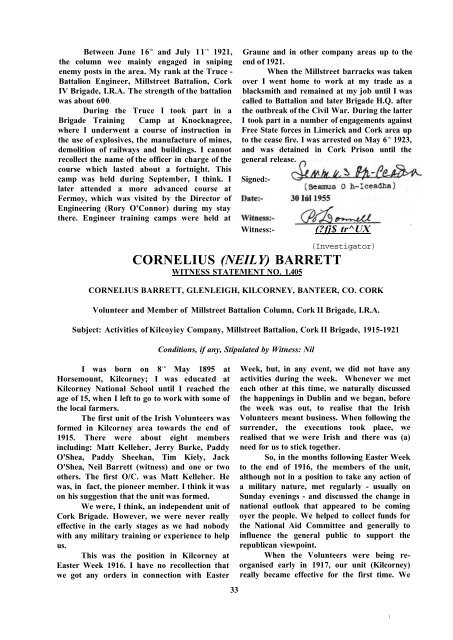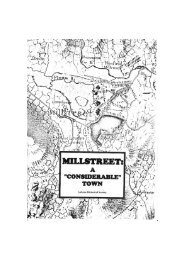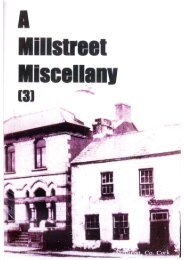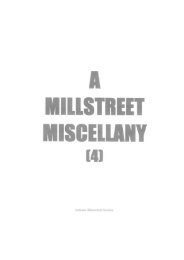The 'Boys' Of The Millstreet Battalion Area - Aubane Historical Society
The 'Boys' Of The Millstreet Battalion Area - Aubane Historical Society
The 'Boys' Of The Millstreet Battalion Area - Aubane Historical Society
You also want an ePaper? Increase the reach of your titles
YUMPU automatically turns print PDFs into web optimized ePapers that Google loves.
Between June 16 th<br />
and July 11 th<br />
1921,<br />
the column wee mainly engaged in sniping<br />
enemy posts in the area. My rank at the Truce -<br />
<strong>Battalion</strong> Engineer, <strong>Millstreet</strong> <strong>Battalion</strong>, Cork<br />
IV Brigade, I.R.A. <strong>The</strong> strength of the battalion<br />
was about 600.<br />
During the Truce I took part in a<br />
Brigade Training Camp at Knocknagree,<br />
where I underwent a course of instruction in<br />
the use of explosives, the manufacture of mines,<br />
demolition of railways and buildings. I cannot<br />
recollect the name of the officer in charge of the<br />
course which lasted about a fortnight. This<br />
camp was held during September, I think. I<br />
later attended a more advanced course at<br />
Fermoy, which was visited by the Director of<br />
Engineering (Rory O'Connor) during my stay<br />
there. Engineer training camps were held at<br />
Graune and in other company areas up to the<br />
end of 1921.<br />
When the <strong>Millstreet</strong> barracks was taken<br />
over I went home to work at my trade as a<br />
blacksmith and remained at my job until I was<br />
called to <strong>Battalion</strong> and later Brigade H.Q. after<br />
the outbreak of the Civil War. During the latter<br />
I took part in a number of engagements against<br />
Free State forces in Limerick and Cork area up<br />
to the cease fire. I was arrested on May 6 th<br />
1923,<br />
and was detained in Cork Prison until the<br />
general release.<br />
Signed:-<br />
Witness:- (?fj$ tr^UX<br />
(Investigator)<br />
CORNELIUS (NEILY) BARRETT<br />
WITNESS STATEMENT NO. 1,405<br />
CORNELIUS BARRETT, GLENLEIGH, KILCORNEY, BANTEER, CO. CORK<br />
Volunteer and Member of <strong>Millstreet</strong> <strong>Battalion</strong> Column, Cork II Brigade, I.R.A.<br />
Subject: Activities of Kilcoyiey Company, <strong>Millstreet</strong> <strong>Battalion</strong>, Cork II Brigade, 1915-1921<br />
I was born on 8 th<br />
May 1895 at<br />
Horsemount, Kilcorney; I was educated at<br />
Kilcorney National School until I reached the<br />
age of 15, when I left to go to work with some of<br />
the local farmers.<br />
<strong>The</strong> first unit of the Irish Volunteers was<br />
formed in Kilcorney area towards the end of<br />
1915. <strong>The</strong>re were about eight members<br />
including: Matt Kelleher, Jerry Burke, Paddy<br />
O'Shea, Paddy Sheehan, Tim Kiely, Jack<br />
O'Shea, Neil Barrett (witness) and one or two<br />
others. <strong>The</strong> first O/C. was Matt Kelleher. He<br />
was, in fact, the pioneer member. I think it was<br />
on his suggestion that the unit was formed.<br />
We were, I think, an independent unit of<br />
Cork Brigade. However, we were never really<br />
effective in the early stages as we had nobody<br />
with any military training or experience to help<br />
us.<br />
This was the position in Kilcorney at<br />
Easter Week 1916. I have no recollection that<br />
we got any orders in connection with Easter<br />
Conditions, if any, Stipulated by Witness: Nil<br />
33<br />
Week, but, in any event, we did not have any<br />
activities during the week. Whenever we met<br />
each other at this time, we naturally discussed<br />
the happenings in Dublin and we began, before<br />
the week was out, to realise that the Irish<br />
Volunteers meant business. When following the<br />
surrender, the executions took place, we<br />
realised that we were Irish and there was (a)<br />
need for us to stick together.<br />
So, in the months following Easter Week<br />
to the end of 1916, the members of the unit,<br />
although not in a position to take any action of<br />
a military nature, met regularly - usually on<br />
Sunday evenings - and discussed the change in<br />
national outlook that appeared to be coming<br />
oyer the people. We helped to collect funds for<br />
the National Aid Committee and generally to<br />
influence the general public to support the<br />
republican viewpoint.<br />
When the Volunteers were being reorganised<br />
early in 1917, our unit (Kilcorney)<br />
really became effective for the first time. We<br />
/





